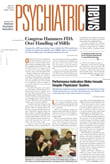A survey of pediatricians indicates that 15 percent of the children they see in their practices have moderate to mild behavioral problems, but many say they feel unprepared to diagnose and treat these disorders adequately.
The disorders they diagnosed frequently or occasionally, usually with the help of standardized instruments such as questionnaires, were attention-deficit/hyperactivity disorder (ADHD), depression, and anxiety.
Forty-seven pediatricians in primary care practices in North Carolina were interviewed by researchers at Wake Forest University Baptist Medical Center. The results were published in the September Pediatrics.
Pediatricians in general are treating more children with psychiatric problems as the result of chronic underfunding of the public mental health system and a shortage of children's mental health specialists, said lead author Jane Williams, Ph.D., and her colleagues.
The pediatricians said that in the area of mental disorders, they most frequently diagnosed and treated ADHD, and expressed a high level of comfort with making the diagnosis, the authors stated.
There was more variation in the pediatricians' diagnosis and treatment of anxiety and depression. Slightly fewer than half of the pediatricians said they frequently diagnosed the mood disorders. Those who prescribed for these disorders generally relied on selective serotonin reuptake inhibitors (SSRIs).
“Pediatricians' comfort level in diagnosing anxiety in particular was strongly related to their prescribing SSRIs,” the authors reported.
They noted that the diagnosis and treatment of ADHD has shifted primarily to pediatricians, and the diagnosis of depression and anxiety in children is shifting to them gradually as well.
The problem this situation raises is that pediatricians reported feeling inadequately prepared in medical school and residency training to treat children with psychiatric disorders, in particular anxiety and depression, and to choose appropriate medications, the authors said.
Their discomfort with prescribing newer drugs for depression and anxiety will undoubtedly increase with the recent controversy about increased suicide risk in children who take SSRIs (see
page 1).
The vast majority (96 percent) of pediatricians reported that they provided psychoeducation for children with behavioral problems. This included supportive counseling, education for coping with ADHD, behavior modification, and/or stress management, Williams and her team reported.
The pediatricians they surveyed “expressed the greatest interest in receiving education about psychopharmacology, diagnosis and treatment of depression and anxiety, and updates on ADHD, the authors stated. “The pediatricians were not interested in receiving education about several high-prevalence disorders they don't often diagnose or treat including conduct disorder and substance abuse.”
An abstract of the article, “Diagnosis and Treatment of Behavioral Health Disorders in Pediatric Practice,” is posted online at<pediatrics.aappublications.org/cgi/content/abstract/114/3/601>.▪
Pediatrics 2004 114 601
